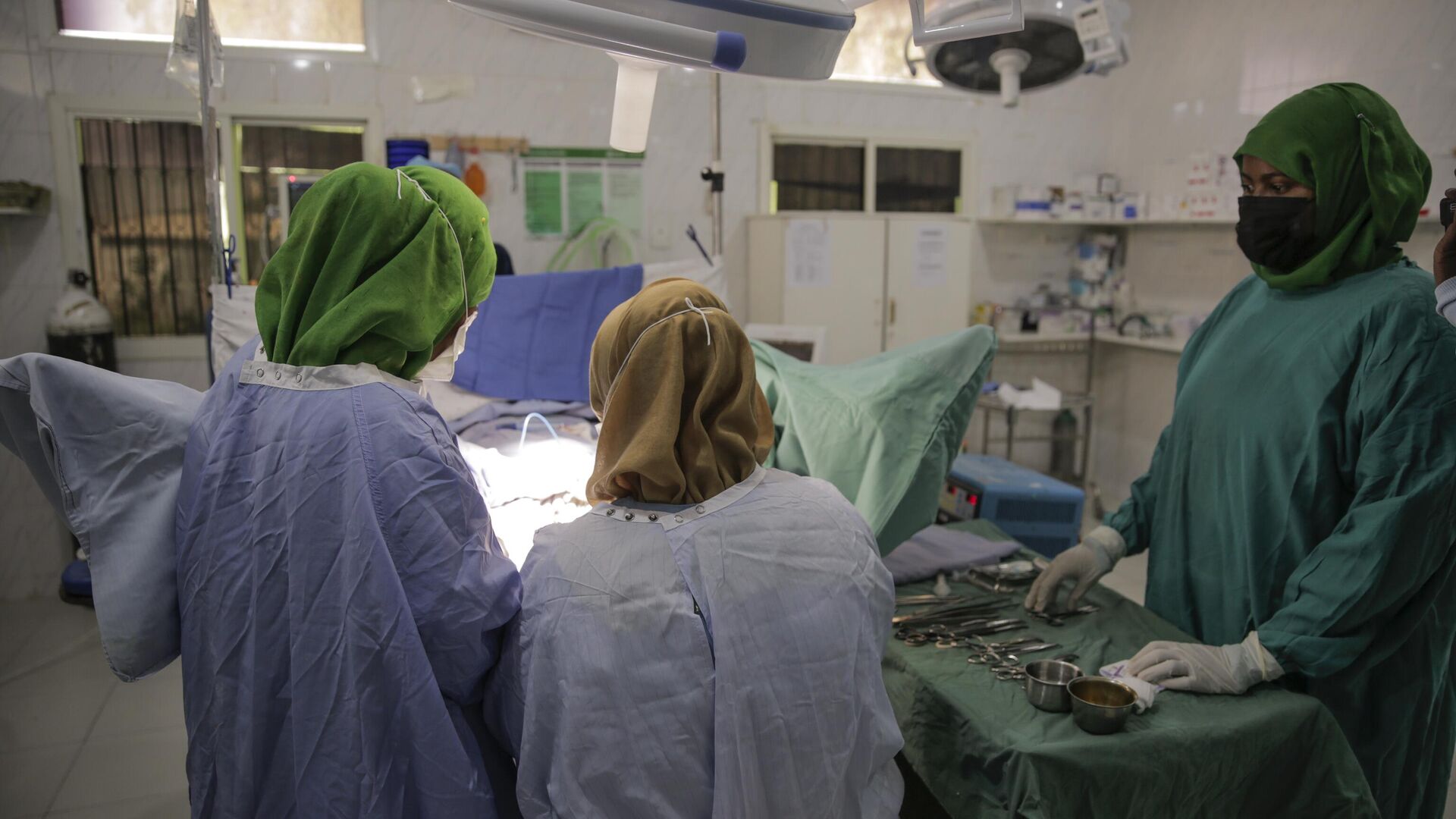https://sputnikglobe.com/20230316/new-who-report-40-african-nations-among-those-facing-acute-health-worker-shortages-1108418347.html
New WHO Report: 40 African Nations Among Those Facing Acute Health Worker Shortages
New WHO Report: 40 African Nations Among Those Facing Acute Health Worker Shortages
Sputnik International
At least 40 African countries are currently facing a severe shortage of healthcare workers, with medical staff stretched thin and struggling to keep up with the demand for care, according to the World Health Organization.
2023-03-16T05:53+0000
2023-03-16T05:53+0000
2023-03-16T05:53+0000
africa
world health organization (who)
healthcare
recruitment
vulnerable
health workers
https://cdn1.img.sputnikglobe.com/img/07e7/03/0f/1108419796_0:160:3073:1888_1920x0_80_0_0_f1a7979b0c9d6fced134511c5e24ac91.jpg
At least 40 African countries are currently facing a severe shortage of healthcare workers, with medical staff stretched thin and struggling to keep up with the demand for care, according to the World Health Organization’s 2023 health workforce support and safeguards list.The updated list labeled 55 countries across the world, including 37 states in the WHO African region, eight in the Western Pacific region, six in the Eastern Mediterranean region (including three African nations: Sudan, Somalia, and Djibouti), three in the South-East Asia region, and one in the Americas that are vulnerable due to a shortage of health workers.The number of vulnerable countries has increased by eight since the WHO first published a tally in 2020, which included 47 countries suffering from a shortage of medical workers. The organization explained this increase citing the "international migration" of healthcare staff. When medical workers emigrate, countries risk not having enough health workers to achieve the UN Sustainable Development Goal target of rolling out universal health coverage (UHC) globally by 2030.The WHO health workforce support and safeguards list bans the "active recruitment" of medical staff from nations that lack a sufficient number of doctors and nurses in order to help those nations protect their healthcare systems.Dr. Jim Campbell, the Director responsible for health worker policy at the WHO, said that some wealthier nations, including the Gulf States and some high-income countries of the Organization for Economic Cooperation and Development (OECD) that consists of all the European Union states, the United States, the United Kingdom, and others, have "traditionally been reliant on international personnel."Campbell added that those countries have recently "accelerated their recruitment and employment to respond to the pandemic and respond to the loss of lives, the infections, the absences of workers during the pandemic."Last October, the British Medical Association (BMA) drew attention to the exploitation of doctors from less developed countries, including those in Africa, by British healthcare companies. African specialists were made to work under conditions which contradict UK laws.Among those affected were Nigerian doctors hired by the firm NES Healthcare. They were recruited despite Nigeria being on the UK government’s "red-list" of 47 countries, which was compiled by the World Health Organization’s 2020 list of health workforce support and safeguards.In November 2022, it was reported that a research consortium in Germany, which is projected to face a deficit of between 400,000 and 600,000 nursing vacancies by 2030, was developing a mechanism that would allow the systematical preparation of African high school graduates for nursing work in the European country.
https://sputnikglobe.com/20221011/nigerian-doctors-open-up-on-being-exploited-by-uk-medical-firm-1101709010.html
africa
Sputnik International
feedback@sputniknews.com
+74956456601
MIA „Rossiya Segodnya“
2023
Muhammad Nooh Osman
https://cdn1.img.sputnikglobe.com/img/07e4/08/0e/1080170965_2:0:2050:2048_100x100_80_0_0_1de8233c87df0979e7e74f61b6ffacad.jpg
Muhammad Nooh Osman
https://cdn1.img.sputnikglobe.com/img/07e4/08/0e/1080170965_2:0:2050:2048_100x100_80_0_0_1de8233c87df0979e7e74f61b6ffacad.jpg
News
en_EN
Sputnik International
feedback@sputniknews.com
+74956456601
MIA „Rossiya Segodnya“
Sputnik International
feedback@sputniknews.com
+74956456601
MIA „Rossiya Segodnya“
Muhammad Nooh Osman
https://cdn1.img.sputnikglobe.com/img/07e4/08/0e/1080170965_2:0:2050:2048_100x100_80_0_0_1de8233c87df0979e7e74f61b6ffacad.jpg
55 countries face a health worker crunch linked to covid-19: who, who renews alert on safeguards for health worker recruitment, who health workforce support and safeguards list 2023,
55 countries face a health worker crunch linked to covid-19: who, who renews alert on safeguards for health worker recruitment, who health workforce support and safeguards list 2023,
New WHO Report: 40 African Nations Among Those Facing Acute Health Worker Shortages
Muhammad Nooh Osman
Writer/Editor
According to the World Health Organization (WHO), the COVID-19 pandemic had exacerbated the problem of health worker shortages in some developing countries, where millions of people were left without access to basic healthcare services, making them more vulnerable to various diseases and illnesses.
At least 40 African countries are currently facing a severe shortage of healthcare workers, with medical staff stretched thin and struggling to keep up with the demand for care, according to the World Health Organization’s 2023 health workforce support and safeguards
list.
The updated list labeled 55 countries across the world, including 37 states in the WHO African region, eight in the Western Pacific region, six in the Eastern Mediterranean region (including three African nations: Sudan, Somalia, and Djibouti), three in the South-East Asia region, and one in the Americas that are vulnerable due to a shortage of health workers.
The number of vulnerable countries has increased by eight since the WHO first published a tally in 2020, which included 47 countries suffering from a shortage of medical workers. The organization explained this increase citing the "international migration" of healthcare staff. When medical workers emigrate, countries risk not having enough health workers to achieve the UN Sustainable Development Goal target of rolling out universal health coverage (UHC) globally by 2030.
"Health workers are the backbone of every health system, and yet 55 countries with some of the world's most fragile health systems do not have enough and many are losing their health workers to international migration," said Dr. Tedros Adhanom Ghebreyesus, WHO Director-General. "The WHO is working with these countries to support them to strengthen their health workforce, and we call on all countries to respect the provisions in the WHO health workforce support and safeguards list."
The WHO health workforce support and safeguards list bans the "active recruitment" of medical staff from nations that lack a sufficient number of doctors and nurses in order to help those nations protect their healthcare systems.

11 October 2022, 14:34 GMT
Dr. Jim Campbell, the Director responsible for health worker policy at the WHO, said that some wealthier nations, including the Gulf States and some high-income countries of the Organization for Economic Cooperation and Development (OECD) that consists of all the European Union states, the United States, the United Kingdom, and others, have "traditionally been reliant on international personnel."
Campbell added that those countries have recently "accelerated their recruitment and employment to respond to the pandemic and respond to the loss of lives, the infections, the absences of workers during the pandemic."
"While reiterating the principle that active recruitment from developing countries facing health workforce challenges is discouraged, the WHO advises that government-to-government agreements related to health worker mobility, under certain circumstances, are not proscribed for the listed countries," the UN agency said.
Last October, the British Medical Association (BMA) drew attention to the
exploitation of doctors from less developed countries, including those in Africa, by British healthcare companies. African specialists were made to work under conditions which contradict UK laws.
Among those affected were Nigerian doctors hired by the firm NES Healthcare. They were recruited despite Nigeria being on the UK government’s "red-list" of 47 countries, which was compiled by the World Health Organization’s 2020 list of health workforce support and safeguards.
In November 2022, it was
reported that a research consortium in Germany, which is projected to face a deficit of between 400,000 and 600,000 nursing vacancies by 2030, was developing a mechanism that would allow the systematical preparation of African high school graduates for nursing work in the European country.




